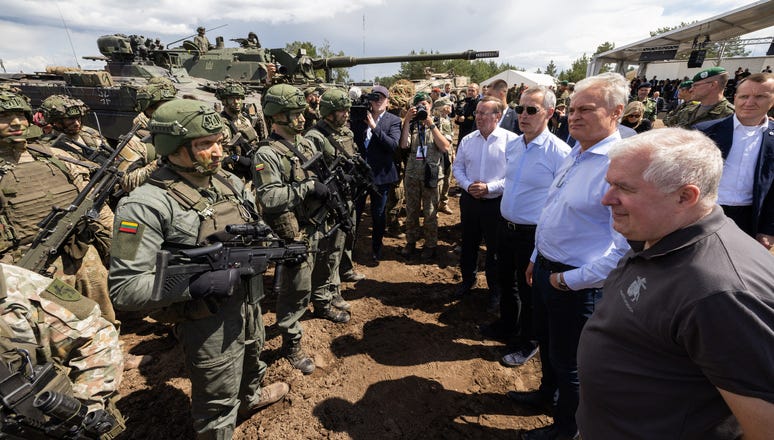Germany Announces Troop Buildup on NATO’s Eastern Flank
German Defense Minister Boris Pistorius announced Berlin is preparing to move thousands of troops into Lithuania. The announcement comes as Berlin and Vilnius engage in joint war games about 100 miles from the Russian border.
On Monday, Pistorius said that 4,000 German troops will be deployed to Lithuania after facilities are built to accommodate them. “Germany is ready to permanently station a robust brigade in Lithuania,” he explained while meeting with officials in Vilnius. “We are talking about a brigade with 4,000 soldiers, with the corresponding materiel, vehicles and everything that goes with it.”
Pistorius believes it will take several months before Lithuania has the infrastructure to support the soldiers. NATO Secretary General Jens Stoltenberg, who joined Pistorius in Vilnius, said the deployment would come at a “significant expense” to Berlin. Lithuania’s Foreign Minister Gabrielius Landsbergis said Vilnius hopes to expedite the process as much as possible.
Vilnius has expressed concern over Wagner Group head Yevgeny Prigozhin’s exile in Belarus, which borders Lithuania. Lithuanian President Gitanas Nausėda claimed the Prigozhin’s presence in Minsk added to the case for NATO to deploy more forces to the Baltic states.
Germany currently has 1,450 soldiers in Lithuania. About half of the troops there are on a permanent deployment, while the others were sent to the country on a temporary basis after the Russian invasion of Ukraine last year.
The 4,000 soldiers will be sent to Lithuania under a rotation deployment. Meaning Berlin will maintain the overall presence, but the soldiers are temporary. The decision to send the forces by Berlin is seen as fulfilling a pledge made by Chancellor Olaf Scholz last year. “This is a very strong announcement by the German government . . . consistent with what has been agreed in the past,” said Landsbergis.
Beyond the troops, Vilinis is hoping NATO members will provide Lithuania with additional l air defense systems.
Pistorius explained that Berlin’s decision to send its troops further East is due to the expansion of the North Atlantic alliance. At the end of the Cold War, Germany represented the alliance’s eastern flank. Now that several former USSR states and Warsaw Pact signatories are a part of NATO, Berlin believes it has the responsibility to defend those nations that border Russia.
“We were the ones who could always rely on our NATO partners to stand by us in an emergency and to stand up and fight with us,” Pistorius said. “Now, Poland and the Baltic countries are particularly exposed.” He continued, “We as the Federal Republic of Germany explicitly acknowledge our responsibility and our obligation as a NATO member state, as the largest economy in Europe, to stand up for the protection of the eastern flank.”
The announcement of the troop deployment came as Berlin and Vilnius are conducting joint war games about 100 miles from the Russian border. Germany sent 300 tanks and 1,000 soldiers to Lithuania for the military exercises.



